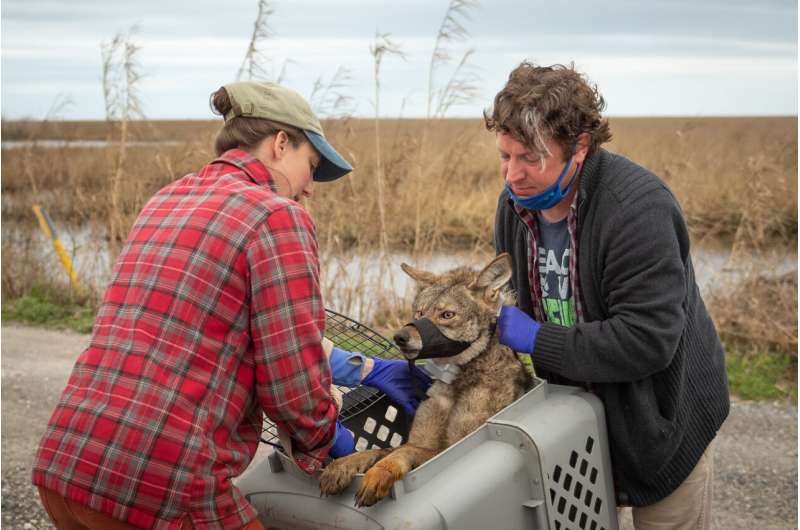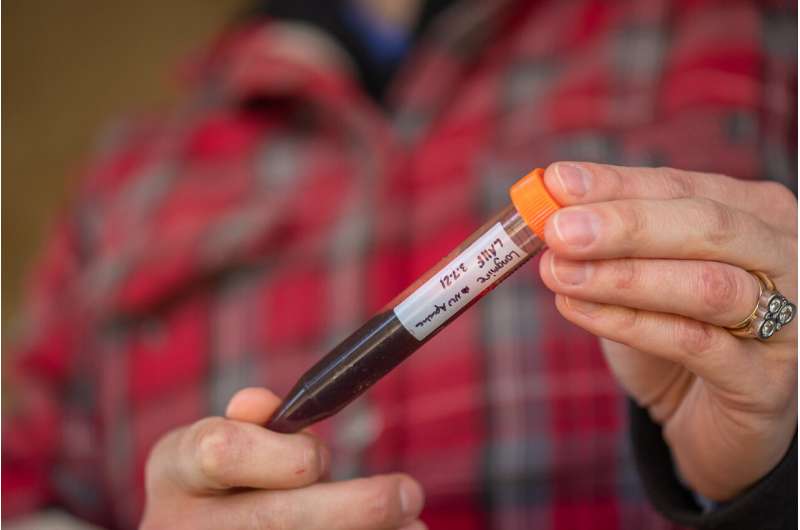Red wolf genes found in coyote hybrids may be the key to preserving the endangered species

A team of researchers affiliated with several institutions in the U.S. reports a high percentage of red wolf genes in the genomes of coyote hybrids living in some parts of southwest Louisiana and eastern Texas. In their paper published in the journal Science Advances, the group describes the find as a possible means of saving red wolves from extinction.
The red wolf is native to many parts of the southeastern United States. It is a subspecies of the gray wolf and is slightly larger than a coyote. The red wolf population has been declining due to human encroachment for many years, and is very nearly extinct today—currently, only 200 exist in captivity and just 20 of them are believed to be living in the wild.
In this new effort, the researchers investigated the genomes of coyotes currently living in parts of Louisiana and Texas that once were home to large numbers of red wolves. Prior research has shown that it was common for red wolves to mate with coyotes back when both shared the same habitats. Coyotes have proven to be more resilient and are not considered to be endangered.
The researchers obtained tissue samples from 31 coyotes living in southwestern Louisiana and studied their genomes. Most specifically, they compared the genomes of the coyotes to the genomes of the red wolf, looking for commonalities. They found that 38–62% of the coyote genome comprised red wolf genes.
They also found that the higher the percentage of wolf genes in the coyote hybrids, the closer the coyote was in size to a red wolf. They also noted that coyotes with higher percentages of red wolf genes looked more like red wolves and behaved like them, as well. They suggest that those with the highest percentages should not be called coyotes at all.

The researchers believe that such large amounts of genetic material in coyote-wolf hybrids could represent a new way to save the wolf from going extinct. They suggest that in the future, when captive bred wolves are released into the wild, it be done where high-percentage coyote hybrids are living. They also suggest that the genetic material in some of the hybrids could be collected and stored to clone new animals.
Should the gray wolf keep its endangered species protection? New genomic research provides the scientific answer
Bridgett M. vonHoldt et al, Reviving ghost alleles: Genetically admixed coyotes along the American Gulf Coast are critical for saving the endangered red wolf, Science Advances (2022). DOI: 10.1126/sciadv.abn7731
© 2022 Science X Network
Citation:
Red wolf genes found in coyote hybrids may be the key to preserving the endangered species (2022, June 30)
retrieved 30 June 2022
from https://phys.org/news/2022-06-red-wolf-genes-coyote-hybrids.html
This document is subject to copyright. Apart from any fair dealing for the purpose of private study or research, no
part may be reproduced without the written permission. The content is provided for information purposes only.
For all the latest Science News Click Here
For the latest news and updates, follow us on Google News.

